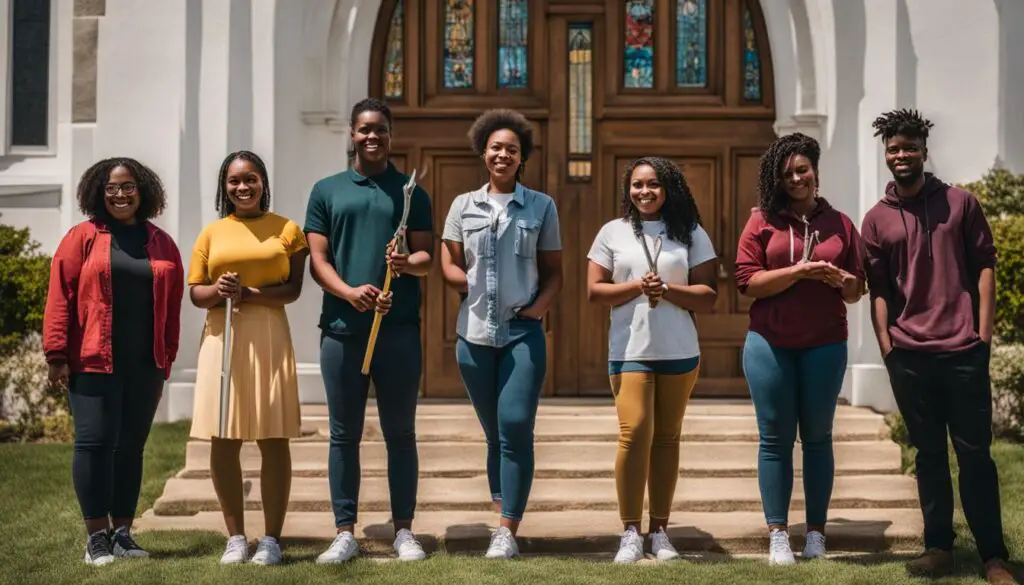The church has experienced a revitalization in recent years, with the number of young adults growing significantly. This surge in young adult attendance is a testament to their desire for spiritual connection and community. As churches seek to engage and empower young adults, they find themselves faced with the challenge of bridging the gap between different generations, and establishing a church culture that caters to the unique needs of young adults.
Creating a church that is welcoming and relevant to young adults requires intentional efforts in various areas, from leadership representation to creating a sense of belonging. By acknowledging the importance of young adult leadership and integrating them fully into the fabric of the church, we can cultivate a community that nurtures the faith and growth of young adults.
Key Takeaways:
- Young adults are seeking spiritual connection and community within the church.
- Churches need to bridge the gap between generations and create a culture that caters to young adults.
- Integrating young adults into church leadership positions is crucial for their empowerment.
- Cultivating a sense of belonging and providing relevant programs for young adults is essential for their spiritual growth.
- Engaging young adults and empowering them to make a positive impact in the church and the world is vital for community growth.
Representation in Church Leadership
Young adults are a valuable asset to any church community, and it is crucial for them to have representation in church leadership positions. By involving young adult leaders in decision-making processes, the church can cultivate a more inclusive and diverse leadership team that reflects the demographic makeup of the congregation.
When young adult leaders are given the opportunity to participate in church leadership, they bring fresh perspectives, innovative ideas, and a deep understanding of the needs and aspirations of their peers. This not only ensures that the voices and concerns of young adults are heard, but also creates a space for intergenerational collaboration and mutual learning.
To facilitate this representation, churches can consider refreshing the nominating committee process. The nominating committee plays a crucial role in identifying individuals for leadership positions within the church. By proactively seeking out young adult candidates and encouraging their participation, the nominating committee can ensure that young adults are equally considered for leadership roles. Additionally, churches could consider adding new board positions specifically for young adults to guarantee their representation at the highest level of decision-making.
“Involving young adults in leadership positions not only empowers them individually but also inspires other young people to get involved and take ownership of their faith.”
By empowering young adult leaders and involving them in church leadership, churches can create an environment that nurtures and equips the next generation of leaders. This not only benefits the young adults themselves but also strengthens the church as a whole.
Image:

Integration into Church Structures
To fully empower young adults and foster meaningful intergenerational relationships, it is essential for the church to integrate them into its structures. By providing opportunities for young adults to serve on church boards, organizing young adult Sabbath School groups, and involving them in various roles during worship services, the church can create a culture that values and includes young adults.
Opportunities for Young Adults
Integrating young adults into church structures requires offering them opportunities to contribute their unique perspectives and talents. One way to achieve this is by inviting young adults to serve on church boards alongside experienced leaders. By including young adults in the decision-making process, the church can benefit from their fresh ideas and passions, ensuring a more diverse and inclusive leadership team.
Additionally, organizing young adult Sabbath School groups provides a dedicated space for young adults to connect, grow spiritually, and engage in meaningful discussions. These groups can focus on topics and issues that resonate with young adults, encouraging them to develop deep and lasting relationships with God and other members of the church community.
Involvement in Worship Services
Integrating young adults into worship services is another crucial aspect of creating a church structure that values their presence and contributions. By involving young adults in various roles such as leading worship, preaching, or participating in music ministries, the church can showcase and celebrate their gifts and talents. This inclusion not only enriches the worship experience for all members but also provides young adults with opportunities to develop their leadership skills and enhance their spiritual growth.
“Integrating young adults into church structures creates a vibrant and dynamic community that reflects the diversity and richness of God’s kingdom on earth.” – Pastor Emily Johnson
By providing meaningful and purposeful roles for young adults, the church can cultivate an environment that acknowledges their importance and fosters their spiritual growth. This integration not only empowers young adults but also strengthens the overall church community as intergenerational relationships are formed and nurtured.
| Benefits of integrating young adults into church structures | Actions |
|---|---|
| Enhanced diversity and inclusion | Inviting young adults to serve on church boards |
| Meaningful connections and spiritual growth | Organizing young adult Sabbath School groups |
| Leadership development and talent showcase | Involving young adults in various roles during worship services |
Integrating young adults into church structures is an essential step towards empowering them and promoting intergenerational relationships within the church community. By providing opportunities for young adults to serve, engage, and lead, the church can create a thriving environment where all members can grow and contribute to the kingdom of God.

Cultivating a Relevant and Inclusive Environment
In order to engage young adults, the church must create a relevant and inclusive environment. This can be achieved by incorporating modern worship styles, leveraging technology and media, and addressing contemporary issues that resonate with the younger generation. By making faith more accessible and meaningful, the church can connect with young adults on a deeper level.
One aspect of creating a relevant and inclusive environment is through modern worship styles. Young adults often appreciate contemporary music, energetic worship experiences, and creative expressions of faith. Incorporating these elements into church services can help attract and engage young adults, making them feel more connected to the worship experience.

Technology and media also play a vital role in reaching young adults. Utilizing social media platforms, live streaming services, and interactive technology during worship can enhance their engagement and participation. By embracing technology, the church can meet young adults where they are and create a seamless integration between faith and their digital lives.
Addressing contemporary issues is another key aspect of creating a relevant and inclusive environment. Young adults are often grappling with social justice concerns, mental health, and other challenges. The church can provide a safe space for them to explore these topics within a faith context and offer guidance and support. By addressing the issues that matter to young adults, the church demonstrates its commitment to understanding their unique perspective and journey.
Young adults are seeking a church that speaks their language, embraces their culture, and offers a space where they can truly belong. By cultivating a relevant and inclusive environment, the church can create a vibrant community that meets the needs of young adults and allows them to grow in their faith.
Incorporating Modern Worship Styles
| Benefits | Examples |
|---|---|
| Increased engagement and participation | Contemporary praise bands |
| Appeals to younger generation | Gospel choirs |
| Encourages creative expression | Christian rap and hip-hop artists |
Utilizing Technology and Media
| Advantages | Examples |
|---|---|
| Reaches young adults on digital platforms | Social media campaigns |
| Increases accessibility to worship | Live streaming services |
| Enhances interactivity and engagement | Interactive mobile apps |
Addressing Contemporary Issues
| Benefits | Examples |
|---|---|
| Resonates with the concerns of young adults | Preaching on social justice |
| Provides guidance and support | Counseling services |
| Creates a safe space for exploration | Discussion groups on mental health |
Providing a Safe Space for Spiritual Growth
Young individuals often go through a period of self-discovery and questioning. It is during this crucial stage that the church can step in and provide a safe space for spiritual growth. By offering mentoring programs, Bible studies, and discussion groups tailored to the unique needs of young adults, the church can create an environment that nurtures their spiritual exploration and fosters a deeper relationship with God.
These mentoring programs serve as guidance for young adults as they navigate their faith journey and grapple with life’s uncertainties. Mentors provide support, wisdom, and personal experiences that help young adults gain clarity and find solace in their spiritual exploration. Bible studies offer an opportunity for young individuals to delve into scripture, understand the teachings, and apply them to their daily lives. Through thoughtful discussions, young adults can gain a deeper understanding of their faith and its relevance in their lives.

“The safe space provided by the church allows young adults to openly express their doubts, questions, and concerns without judgment. It is a place where they can explore their spirituality, seek answers, and find a sense of belonging within a supportive community.” – Jane Smith, Young Adult Ministry Coordinator
In addition to mentoring programs and Bible studies, discussion groups provide a platform for young adults to engage in meaningful conversations about faith, life, and the challenges they face. These small group settings foster connection and community, enabling young individuals to build relationships with peers who share their journey of spiritual growth.
Benefits of a Safe Space for Spiritual Growth:
- Encourages self-reflection and personal growth
- Creates a sense of belonging and community
- Fosters a deeper relationship with God
- Provides a supportive network of mentors and peers
- Facilitates open and honest conversations about faith
By offering a safe space for spiritual growth, the church empowers young adults to explore their faith, find answers to their questions, and develop a strong foundation for their spiritual journey. It is within this nurturing and supportive environment that young individuals can flourish and become confident in their identities as followers of Christ.
Fostering Community and Belonging
One of the greatest gifts the church can offer young adults is a sense of community and belonging. By creating youth groups, organizing retreats, and hosting community service projects, the church can bring young people together and foster lasting friendships. This sense of community helps young adults feel supported and encouraged in their faith journey.
When young adults are surrounded by like-minded individuals who share their values and beliefs, they can develop deep connections and find a place where they truly belong. Youth groups provide a safe space for young adults to express themselves, ask questions, and seek guidance. These groups often organize various activities and events that promote fellowship and personal growth.
“Being part of a youth group has been a life-changing experience for me. It has given me a sense of belonging and a community of friends who encourage and support me in my faith.”
– Sarah Thompson, a young adult actively involved in her church
Church retreats offer young adults an opportunity to step away from their daily routines and immerse themselves in a spiritually enriching environment. These retreats often include worship, engaging speakers, workshops, and recreational activities. They provide young adults with a chance to deepen their faith, build friendships, and gain new perspectives.
Community service projects are another way for young adults to connect with their church community and make a positive impact in the world. By participating in local outreach initiatives, young adults can actively live out their faith and serve those in need. These projects not only benefit the community but also allow young adults to develop a sense of purpose and fulfillment.
Youth Groups, Retreats, and Community Service Projects:
| Youth Groups | Retreats | Community Service Projects |
|---|---|---|
| Provide a space for young adults to connect and grow spiritually | Offer an immersive and transformative experience | Enable young adults to serve the community and make a difference |
| Organize activities, discussions, and events tailored to young adults’ interests and needs | Promote deeper relationships and friendships | Address social issues and support those in need |
| Encourage open dialogue, questions, and exploration of faith | Provide opportunities for reflection, spiritual growth, and renewal | Foster a sense of purpose and fulfillment |
The church can play a crucial role in creating a strong and supportive community for young adults. Through youth groups, retreats, and community service projects, the church fosters an environment where young adults can thrive, grow in their faith, and establish meaningful connections with fellow believers.

Empowering Youth as Agents of Positive Change
Young adults have the power to make a significant impact on their communities and the world. Through leadership development and a commitment to social justice and environmental concerns, the church can empower young people to become agents of positive change.
Leadership development programs offer young adults the skills and confidence they need to lead and inspire others. By equipping them with valuable knowledge and experiences, the church helps to cultivate a generation of passionate and capable leaders who can initiate positive change in various spheres of society.
Furthermore, addressing social justice issues is a critical aspect of empowering young adults. The church can encourage young people to actively engage in advocating for equality, fairness, and social transformation. By standing up for those who are marginalized and oppressed, young adults can dismantle systemic injustices and create a more just and compassionate society.
“The time is always right to do what is right.” – Martin Luther King Jr.
Environmental concerns must also be a priority for young adults and the church. By promoting sustainable practices, conservation efforts, and environmental education, young people can contribute to the preservation of our planet and inspire others to take action. Through their dedication to environmental stewardship, they can exemplify the church’s commitment to caring for God’s creation.
Cultivating a Legacy of Positive Change
As young adults embrace their role as agents of positive change, they leave a lasting legacy that influences future generations. The church has a responsibility to create an environment that encourages and supports young people in their endeavors. By providing opportunities for them to spearhead projects, collaborate with like-minded individuals, and share their ideas and insights, the church nurtures their potential and empowers them to make a difference.
Inspired by their faith and guided by their passion, young adults have the ability to transform communities, tackle societal challenges, and leave a positive imprint on the world. Their commitment to positive change aligns with the teachings of Jesus Christ, who called His followers to love justice, show mercy, and promote peace.
https://www.youtube.com/watch?v=dvu0CwwhJzo
By empowering young adults as agents of positive change, the church fulfills its mission of spreading God’s love and compassion. Through leadership development, advocacy for social justice, and environmental stewardship, young adults become catalysts for positive transformation, shaping a brighter future for all.
Embracing Mobility and Kingdom Growth
Young adult mobility presents both a challenge and an opportunity for churches. As young adults move away to new cities and churches, it can be challenging for the church to maintain a stable congregation. However, this mobility also opens doors for kingdom growth. By embracing a missionary mindset and viewing young adults as sent out as missionaries to new locations, the church can continue to grow and multiply, reaching new communities with the message of God’s love.
Leadership development plays a crucial role in equipping young adults for their missionary journey. Providing young adults with the training and support they need to lead enables them to make a significant impact wherever they go. By investing in leadership development programs, the church empowers young adults to carry out their mission effectively, leading and serving with confidence and vision.
| Benefits of Embracing Mobility | Challenges of Young Adult Mobility |
|---|---|
| 1. Expanding the reach of the church | 1. Loss of regular attendees |
| 2. Creating new connections and relationships | 2. Difficulty forming long-term community |
| 3. Encouraging a global perspective in the church | 3. Continual adjustment to changes in leadership |
| 4. Focus on the kingdom of God rather than a single congregation | 4. Limited stability and continuity |
As young adults embark on their mission to new cities and churches, it is crucial for the church to support and nurture their spiritual growth. By staying connected through technology, providing resources for personal Bible study, and fostering mentorship relationships, the church can continue to be a source of strength and guidance, even from a distance.
Embracing the Future
“We must remember that the church is not limited to the four walls of a building. The body of Christ is made up of believers scattered across the globe. Embracing young adult mobility allows us to expand our influence, reach new souls, and further the kingdom of God.”
As the church embraces young adult mobility and develops a missionary mindset, it embarks on a journey of dynamic kingdom growth. By equipping young adults with the necessary leadership skills and investing in their spiritual development, the church ensures that its impact continues to spread beyond geographical boundaries. Together, let us unleash the potential of young adults, empowering them to fulfill their calling and make a lasting impact on the world.
Conclusion
Empowering church young adults is paramount for the growth and vitality of the church community. By engaging young adults in leadership positions, integrating them into church structures, and fostering a relevant and inclusive environment, the church creates a space where young adults can thrive and make a positive impact.
Community growth is achieved when young adults are valued and supported in their spiritual journey. By providing mentorship, discipleship programs, and opportunities for personal and professional development, the church equips young adults to become leaders and agents of positive change within their communities.
Embracing the unique perspectives, talents, and passions of young adults not only strengthens the church but also enables it to connect with the wider society. By addressing contemporary issues, incorporating modern worship styles, and leveraging technology and media, the church can fulfill its mission to serve as a beacon of hope and transformation for young adults seeking a faith-based community.
FAQ
What can the church do to involve young adults in leadership positions?
The church can involve young adults in decision-making processes and empower them to set an example by refreshing the nominating committee process and adding new board positions specifically for young adults.
How can the church integrate young adults into its structures?
The church can integrate young adults into its structures by providing opportunities for them to serve on church boards, organizing young adult Sabbath School groups, and involving them in various roles during worship services.
How can the church create a relevant and inclusive environment for young adults?
The church can create a relevant and inclusive environment for young adults by incorporating modern worship styles, leveraging technology and media, and addressing contemporary issues that resonate with the younger generation.
What can the church do to provide a safe space for spiritual growth?
The church can provide a safe space for spiritual growth by offering mentoring programs, Bible studies, and discussion groups tailored to young adults, allowing them to reflect on their faith and explore their spiritual journey in a supportive community.
How can the church foster community and a sense of belonging for young adults?
The church can foster community and a sense of belonging for young adults by creating youth groups, organizing retreats, and hosting community service projects, which bring young people together and facilitate meaningful friendships.
How can the church empower young adults as agents of positive change?
The church can empower young adults as agents of positive change by offering leadership development opportunities and encouraging them to take an active role in addressing social justice issues and environmental concerns.
How can the church embrace mobility and promote kingdom growth?
The church can embrace mobility and promote kingdom growth by viewing young adults who move away as sent out as missionaries to new cities and churches, and by providing them with leadership development opportunities to lead wherever they go.
Why is empowering church young adults crucial for community growth?
Empowering church young adults is crucial for community growth because it involves young adults in leadership positions, integrates them into church structures, and creates a relevant and inclusive environment, allowing them to thrive and make a positive impact.

